The Effects of Social Media on Brand & Customer Relationships
VerifiedAdded on 2023/01/16
|7
|1317
|77
AI Summary
This paper explores the effects of social media marketing on brand and customer relationships. It aims to determine the extent to which social media marketing affects customers' perception of brands and how social media engagement leads to humanizing brands and higher brand relationships. The paper also discusses effective strategies for brand-customer relationships.
Contribute Materials
Your contribution can guide someone’s learning journey. Share your
documents today.
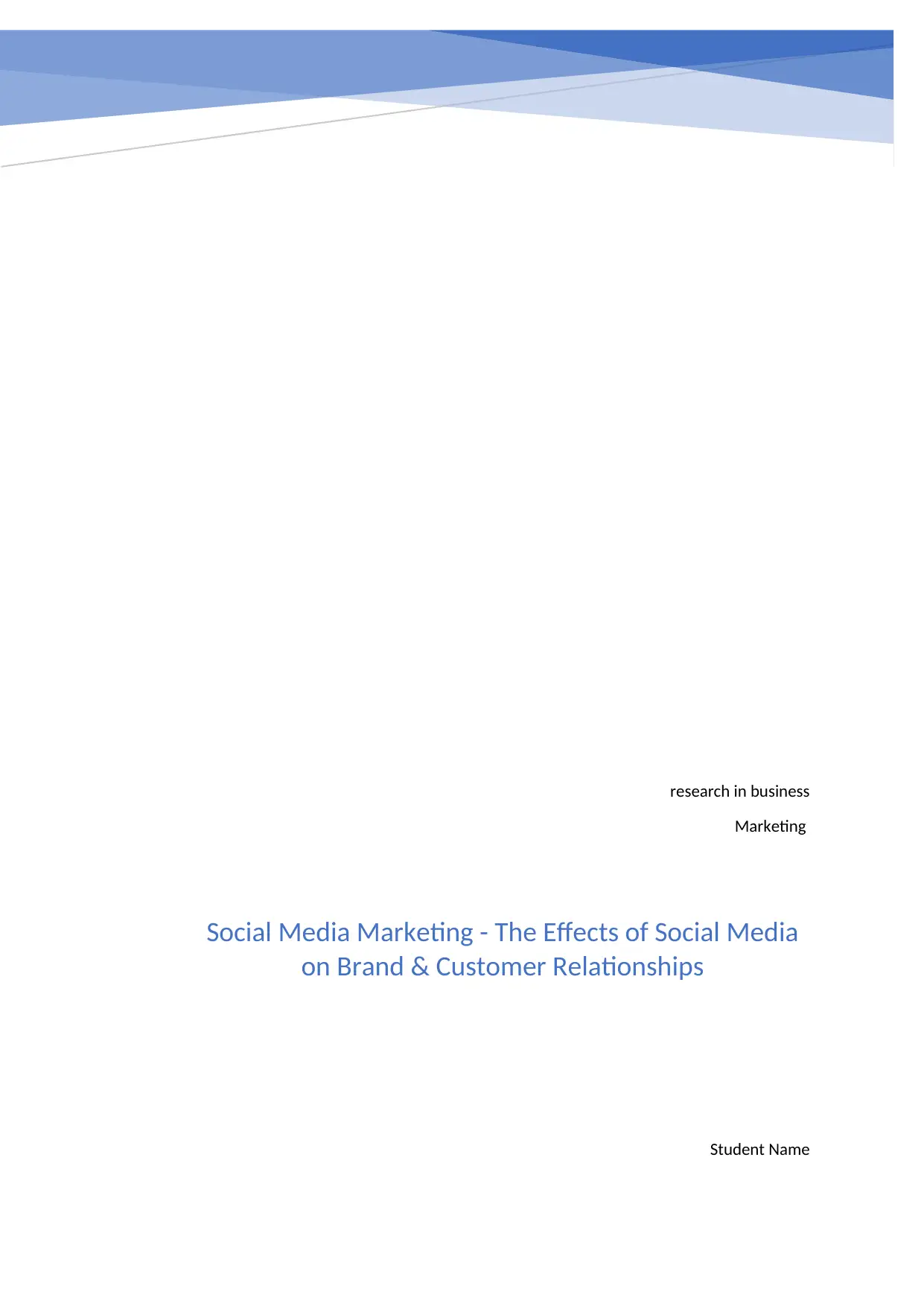
Social Media Marketing - The Effects of Social Media
on Brand & Customer Relationships
Student Name
research in business
Marketing
on Brand & Customer Relationships
Student Name
research in business
Marketing
Secure Best Marks with AI Grader
Need help grading? Try our AI Grader for instant feedback on your assignments.
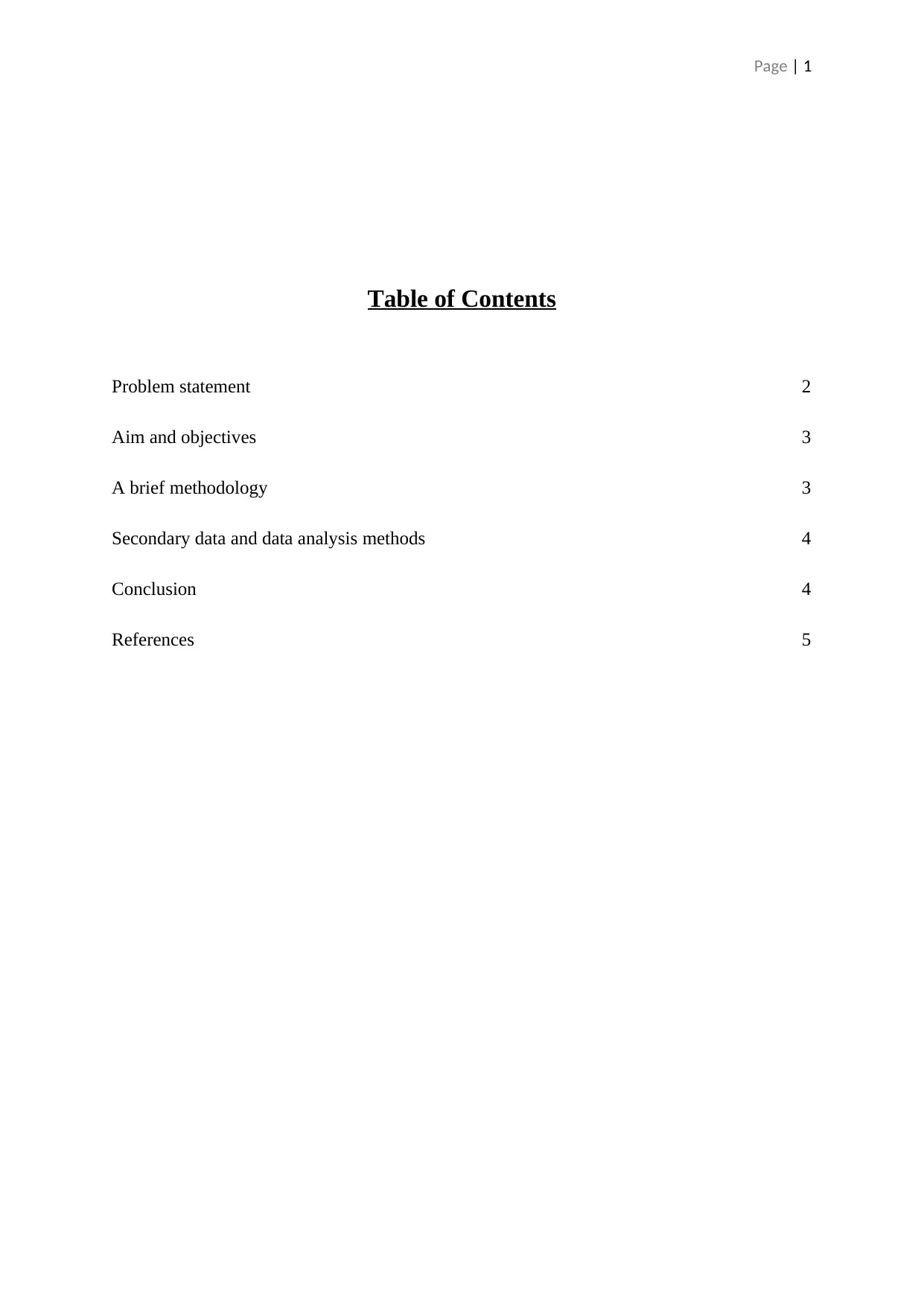
Page | 1
Table of Contents
Problem statement 2
Aim and objectives 3
A brief methodology 3
Secondary data and data analysis methods 4
Conclusion 4
References 5
Table of Contents
Problem statement 2
Aim and objectives 3
A brief methodology 3
Secondary data and data analysis methods 4
Conclusion 4
References 5
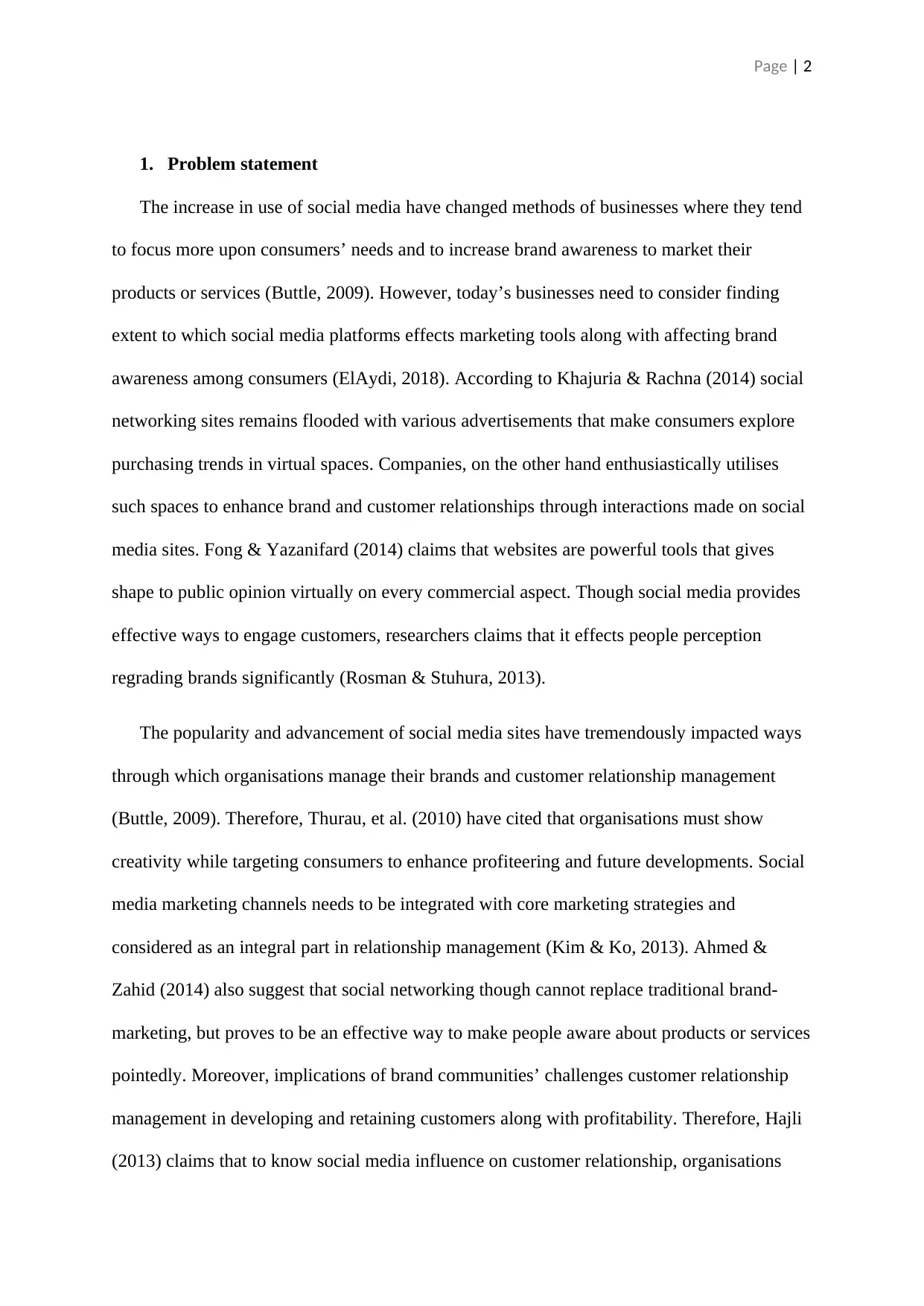
Page | 2
1. Problem statement
The increase in use of social media have changed methods of businesses where they tend
to focus more upon consumers’ needs and to increase brand awareness to market their
products or services (Buttle, 2009). However, today’s businesses need to consider finding
extent to which social media platforms effects marketing tools along with affecting brand
awareness among consumers (ElAydi, 2018). According to Khajuria & Rachna (2014) social
networking sites remains flooded with various advertisements that make consumers explore
purchasing trends in virtual spaces. Companies, on the other hand enthusiastically utilises
such spaces to enhance brand and customer relationships through interactions made on social
media sites. Fong & Yazanifard (2014) claims that websites are powerful tools that gives
shape to public opinion virtually on every commercial aspect. Though social media provides
effective ways to engage customers, researchers claims that it effects people perception
regrading brands significantly (Rosman & Stuhura, 2013).
The popularity and advancement of social media sites have tremendously impacted ways
through which organisations manage their brands and customer relationship management
(Buttle, 2009). Therefore, Thurau, et al. (2010) have cited that organisations must show
creativity while targeting consumers to enhance profiteering and future developments. Social
media marketing channels needs to be integrated with core marketing strategies and
considered as an integral part in relationship management (Kim & Ko, 2013). Ahmed &
Zahid (2014) also suggest that social networking though cannot replace traditional brand-
marketing, but proves to be an effective way to make people aware about products or services
pointedly. Moreover, implications of brand communities’ challenges customer relationship
management in developing and retaining customers along with profitability. Therefore, Hajli
(2013) claims that to know social media influence on customer relationship, organisations
1. Problem statement
The increase in use of social media have changed methods of businesses where they tend
to focus more upon consumers’ needs and to increase brand awareness to market their
products or services (Buttle, 2009). However, today’s businesses need to consider finding
extent to which social media platforms effects marketing tools along with affecting brand
awareness among consumers (ElAydi, 2018). According to Khajuria & Rachna (2014) social
networking sites remains flooded with various advertisements that make consumers explore
purchasing trends in virtual spaces. Companies, on the other hand enthusiastically utilises
such spaces to enhance brand and customer relationships through interactions made on social
media sites. Fong & Yazanifard (2014) claims that websites are powerful tools that gives
shape to public opinion virtually on every commercial aspect. Though social media provides
effective ways to engage customers, researchers claims that it effects people perception
regrading brands significantly (Rosman & Stuhura, 2013).
The popularity and advancement of social media sites have tremendously impacted ways
through which organisations manage their brands and customer relationship management
(Buttle, 2009). Therefore, Thurau, et al. (2010) have cited that organisations must show
creativity while targeting consumers to enhance profiteering and future developments. Social
media marketing channels needs to be integrated with core marketing strategies and
considered as an integral part in relationship management (Kim & Ko, 2013). Ahmed &
Zahid (2014) also suggest that social networking though cannot replace traditional brand-
marketing, but proves to be an effective way to make people aware about products or services
pointedly. Moreover, implications of brand communities’ challenges customer relationship
management in developing and retaining customers along with profitability. Therefore, Hajli
(2013) claims that to know social media influence on customer relationship, organisations
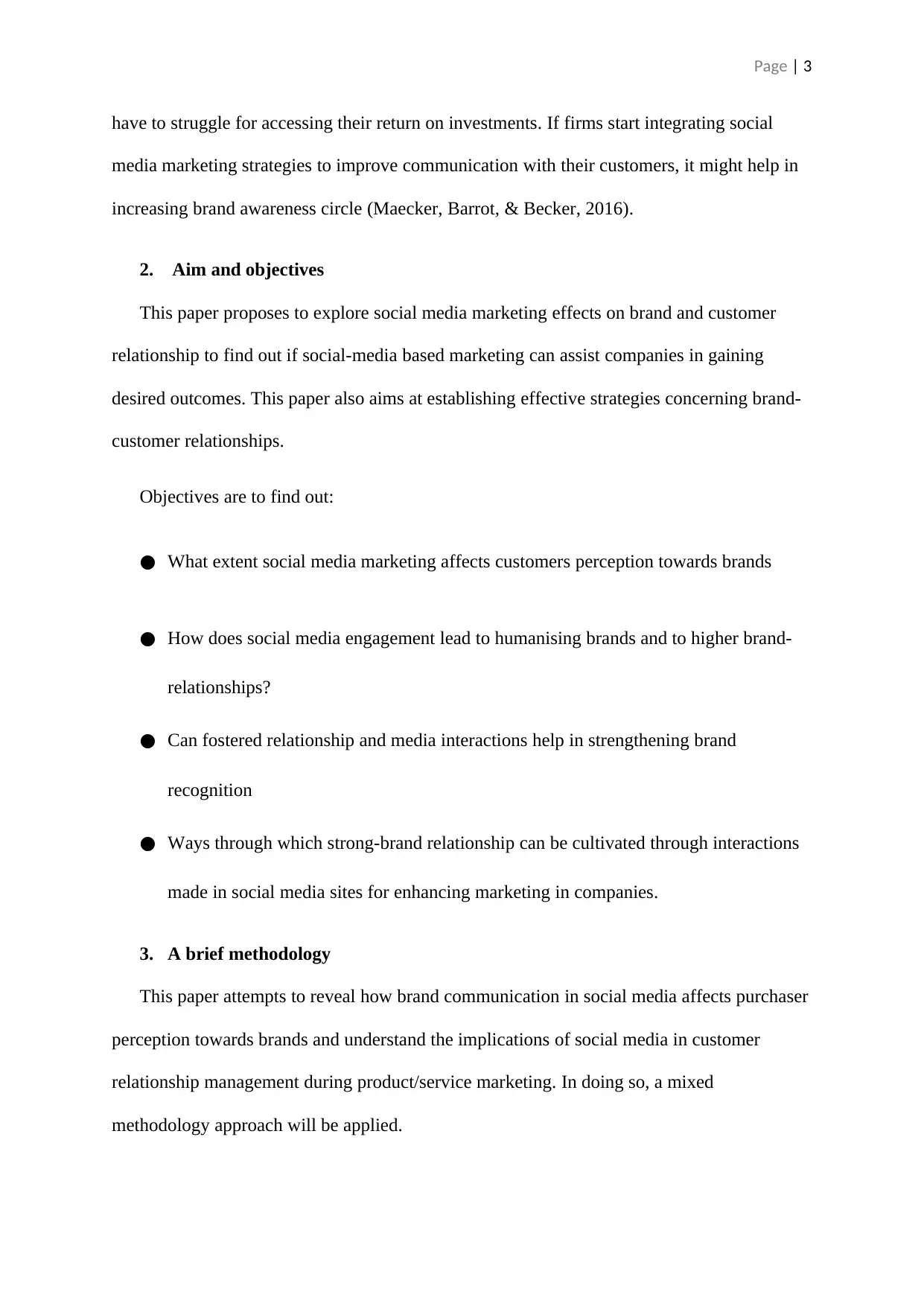
Page | 3
have to struggle for accessing their return on investments. If firms start integrating social
media marketing strategies to improve communication with their customers, it might help in
increasing brand awareness circle (Maecker, Barrot, & Becker, 2016).
2. Aim and objectives
This paper proposes to explore social media marketing effects on brand and customer
relationship to find out if social-media based marketing can assist companies in gaining
desired outcomes. This paper also aims at establishing effective strategies concerning brand-
customer relationships.
Objectives are to find out:
● What extent social media marketing affects customers perception towards brands
● How does social media engagement lead to humanising brands and to higher brand-
relationships?
● Can fostered relationship and media interactions help in strengthening brand
recognition
● Ways through which strong-brand relationship can be cultivated through interactions
made in social media sites for enhancing marketing in companies.
3. A brief methodology
This paper attempts to reveal how brand communication in social media affects purchaser
perception towards brands and understand the implications of social media in customer
relationship management during product/service marketing. In doing so, a mixed
methodology approach will be applied.
have to struggle for accessing their return on investments. If firms start integrating social
media marketing strategies to improve communication with their customers, it might help in
increasing brand awareness circle (Maecker, Barrot, & Becker, 2016).
2. Aim and objectives
This paper proposes to explore social media marketing effects on brand and customer
relationship to find out if social-media based marketing can assist companies in gaining
desired outcomes. This paper also aims at establishing effective strategies concerning brand-
customer relationships.
Objectives are to find out:
● What extent social media marketing affects customers perception towards brands
● How does social media engagement lead to humanising brands and to higher brand-
relationships?
● Can fostered relationship and media interactions help in strengthening brand
recognition
● Ways through which strong-brand relationship can be cultivated through interactions
made in social media sites for enhancing marketing in companies.
3. A brief methodology
This paper attempts to reveal how brand communication in social media affects purchaser
perception towards brands and understand the implications of social media in customer
relationship management during product/service marketing. In doing so, a mixed
methodology approach will be applied.
Secure Best Marks with AI Grader
Need help grading? Try our AI Grader for instant feedback on your assignments.
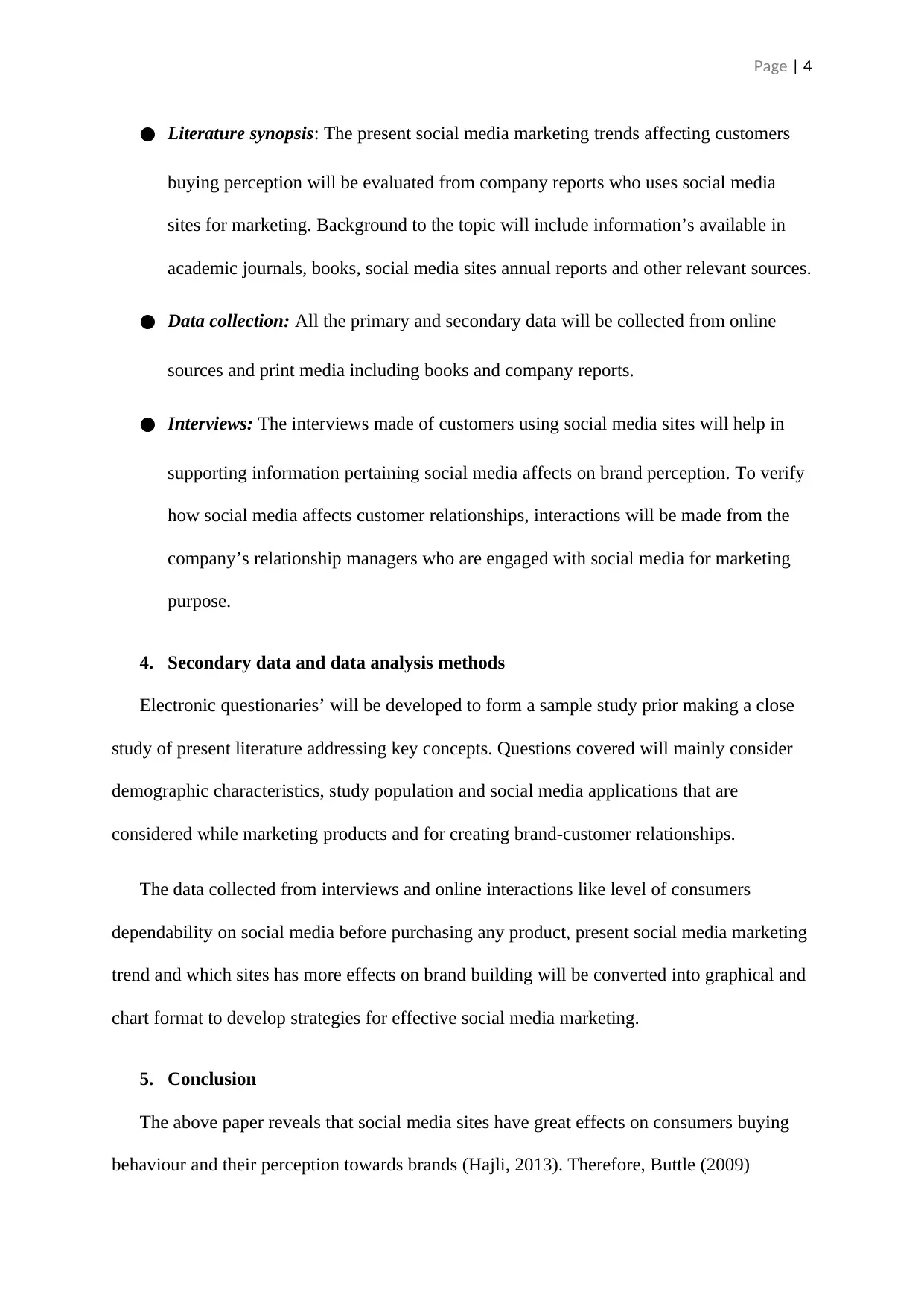
Page | 4
● Literature synopsis: The present social media marketing trends affecting customers
buying perception will be evaluated from company reports who uses social media
sites for marketing. Background to the topic will include information’s available in
academic journals, books, social media sites annual reports and other relevant sources.
● Data collection: All the primary and secondary data will be collected from online
sources and print media including books and company reports.
● Interviews: The interviews made of customers using social media sites will help in
supporting information pertaining social media affects on brand perception. To verify
how social media affects customer relationships, interactions will be made from the
company’s relationship managers who are engaged with social media for marketing
purpose.
4. Secondary data and data analysis methods
Electronic questionaries’ will be developed to form a sample study prior making a close
study of present literature addressing key concepts. Questions covered will mainly consider
demographic characteristics, study population and social media applications that are
considered while marketing products and for creating brand-customer relationships.
The data collected from interviews and online interactions like level of consumers
dependability on social media before purchasing any product, present social media marketing
trend and which sites has more effects on brand building will be converted into graphical and
chart format to develop strategies for effective social media marketing.
5. Conclusion
The above paper reveals that social media sites have great effects on consumers buying
behaviour and their perception towards brands (Hajli, 2013). Therefore, Buttle (2009)
● Literature synopsis: The present social media marketing trends affecting customers
buying perception will be evaluated from company reports who uses social media
sites for marketing. Background to the topic will include information’s available in
academic journals, books, social media sites annual reports and other relevant sources.
● Data collection: All the primary and secondary data will be collected from online
sources and print media including books and company reports.
● Interviews: The interviews made of customers using social media sites will help in
supporting information pertaining social media affects on brand perception. To verify
how social media affects customer relationships, interactions will be made from the
company’s relationship managers who are engaged with social media for marketing
purpose.
4. Secondary data and data analysis methods
Electronic questionaries’ will be developed to form a sample study prior making a close
study of present literature addressing key concepts. Questions covered will mainly consider
demographic characteristics, study population and social media applications that are
considered while marketing products and for creating brand-customer relationships.
The data collected from interviews and online interactions like level of consumers
dependability on social media before purchasing any product, present social media marketing
trend and which sites has more effects on brand building will be converted into graphical and
chart format to develop strategies for effective social media marketing.
5. Conclusion
The above paper reveals that social media sites have great effects on consumers buying
behaviour and their perception towards brands (Hajli, 2013). Therefore, Buttle (2009)
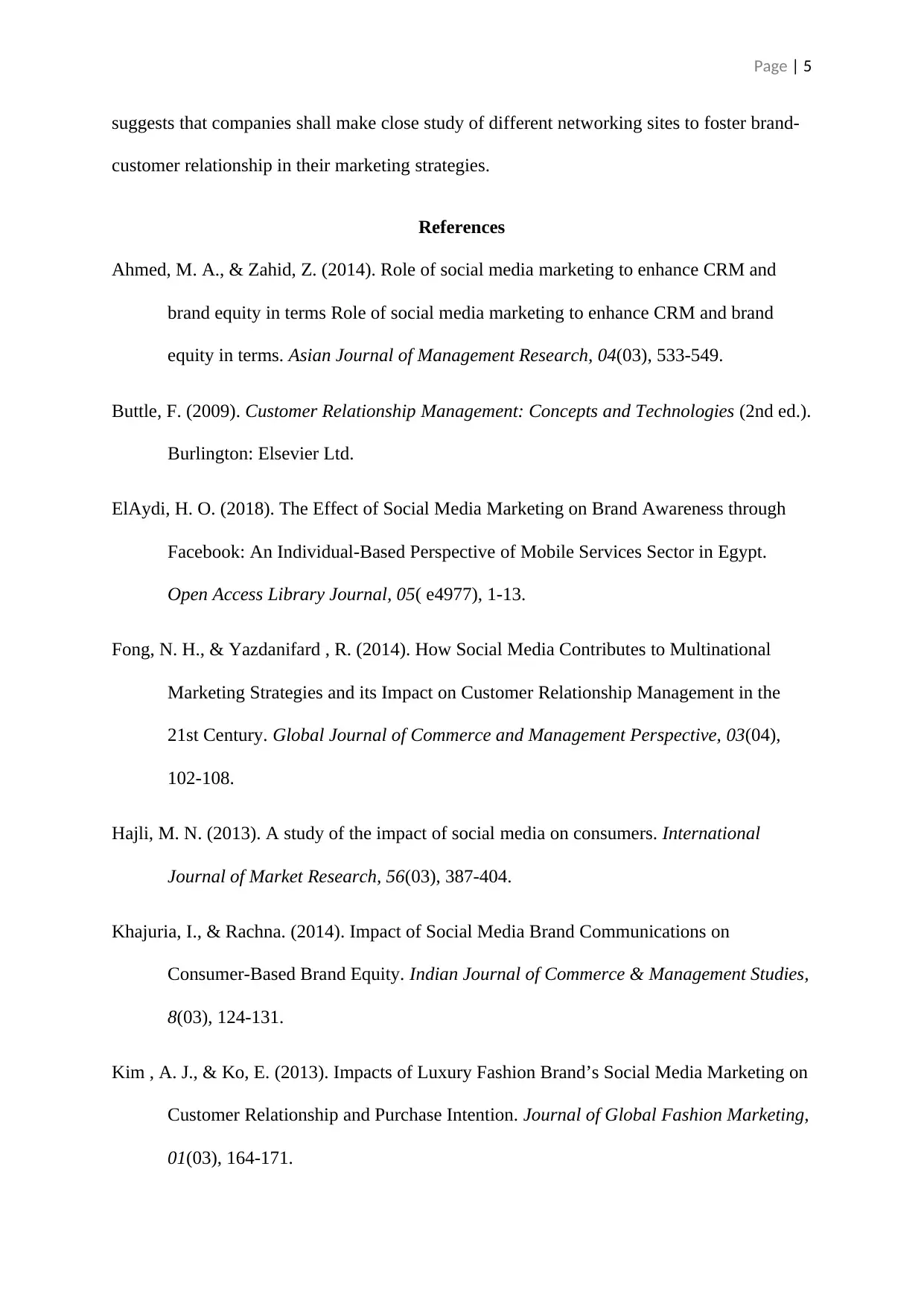
Page | 5
suggests that companies shall make close study of different networking sites to foster brand-
customer relationship in their marketing strategies.
References
Ahmed, M. A., & Zahid, Z. (2014). Role of social media marketing to enhance CRM and
brand equity in terms Role of social media marketing to enhance CRM and brand
equity in terms. Asian Journal of Management Research, 04(03), 533-549.
Buttle, F. (2009). Customer Relationship Management: Concepts and Technologies (2nd ed.).
Burlington: Elsevier Ltd.
ElAydi, H. O. (2018). The Effect of Social Media Marketing on Brand Awareness through
Facebook: An Individual-Based Perspective of Mobile Services Sector in Egypt.
Open Access Library Journal, 05( e4977), 1-13.
Fong, N. H., & Yazdanifard , R. (2014). How Social Media Contributes to Multinational
Marketing Strategies and its Impact on Customer Relationship Management in the
21st Century. Global Journal of Commerce and Management Perspective, 03(04),
102-108.
Hajli, M. N. (2013). A study of the impact of social media on consumers. International
Journal of Market Research, 56(03), 387-404.
Khajuria, I., & Rachna. (2014). Impact of Social Media Brand Communications on
Consumer-Based Brand Equity. Indian Journal of Commerce & Management Studies,
8(03), 124-131.
Kim , A. J., & Ko, E. (2013). Impacts of Luxury Fashion Brand’s Social Media Marketing on
Customer Relationship and Purchase Intention. Journal of Global Fashion Marketing,
01(03), 164-171.
suggests that companies shall make close study of different networking sites to foster brand-
customer relationship in their marketing strategies.
References
Ahmed, M. A., & Zahid, Z. (2014). Role of social media marketing to enhance CRM and
brand equity in terms Role of social media marketing to enhance CRM and brand
equity in terms. Asian Journal of Management Research, 04(03), 533-549.
Buttle, F. (2009). Customer Relationship Management: Concepts and Technologies (2nd ed.).
Burlington: Elsevier Ltd.
ElAydi, H. O. (2018). The Effect of Social Media Marketing on Brand Awareness through
Facebook: An Individual-Based Perspective of Mobile Services Sector in Egypt.
Open Access Library Journal, 05( e4977), 1-13.
Fong, N. H., & Yazdanifard , R. (2014). How Social Media Contributes to Multinational
Marketing Strategies and its Impact on Customer Relationship Management in the
21st Century. Global Journal of Commerce and Management Perspective, 03(04),
102-108.
Hajli, M. N. (2013). A study of the impact of social media on consumers. International
Journal of Market Research, 56(03), 387-404.
Khajuria, I., & Rachna. (2014). Impact of Social Media Brand Communications on
Consumer-Based Brand Equity. Indian Journal of Commerce & Management Studies,
8(03), 124-131.
Kim , A. J., & Ko, E. (2013). Impacts of Luxury Fashion Brand’s Social Media Marketing on
Customer Relationship and Purchase Intention. Journal of Global Fashion Marketing,
01(03), 164-171.
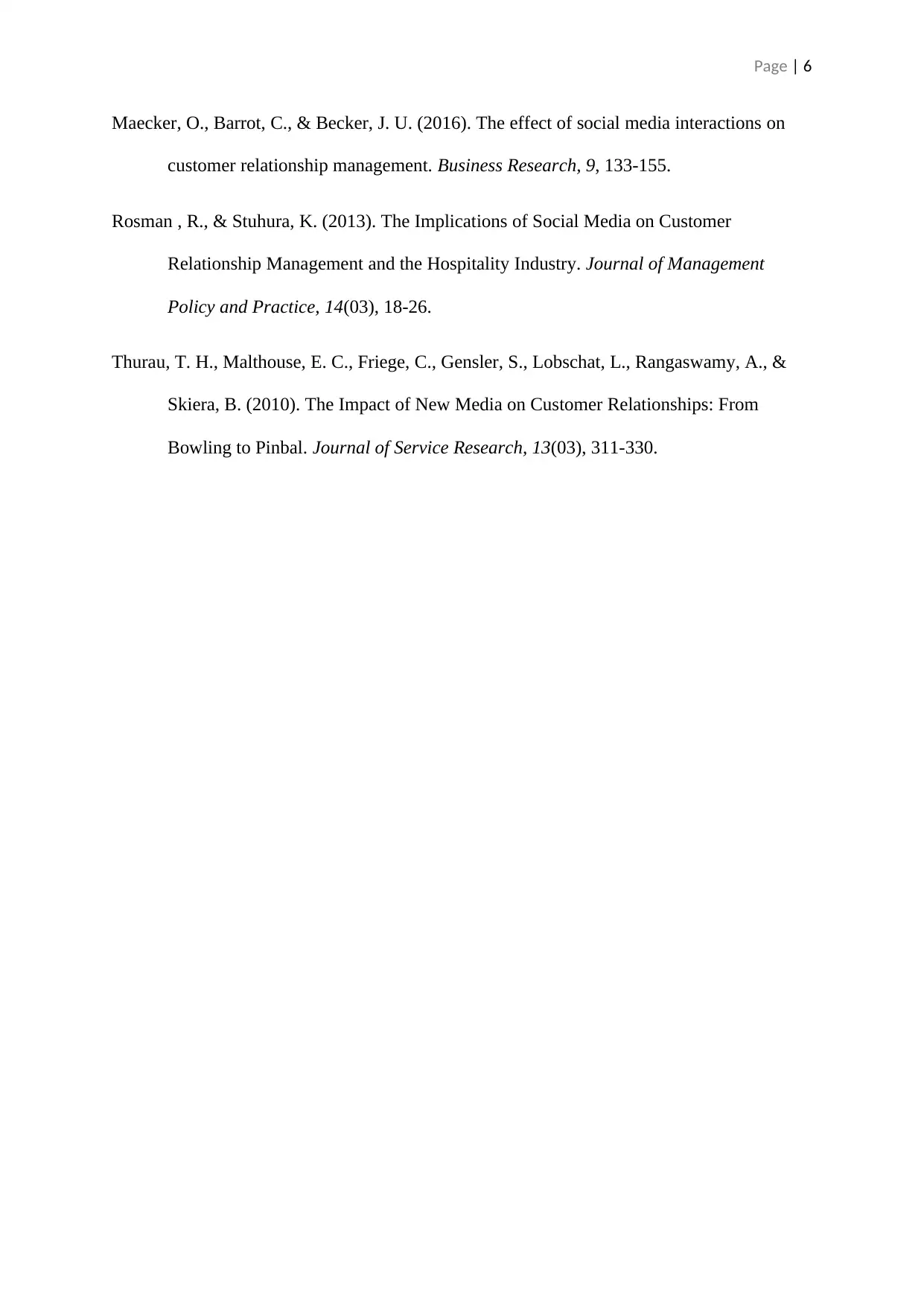
Page | 6
Maecker, O., Barrot, C., & Becker, J. U. (2016). The effect of social media interactions on
customer relationship management. Business Research, 9, 133-155.
Rosman , R., & Stuhura, K. (2013). The Implications of Social Media on Customer
Relationship Management and the Hospitality Industry. Journal of Management
Policy and Practice, 14(03), 18-26.
Thurau, T. H., Malthouse, E. C., Friege, C., Gensler, S., Lobschat, L., Rangaswamy, A., &
Skiera, B. (2010). The Impact of New Media on Customer Relationships: From
Bowling to Pinbal. Journal of Service Research, 13(03), 311-330.
Maecker, O., Barrot, C., & Becker, J. U. (2016). The effect of social media interactions on
customer relationship management. Business Research, 9, 133-155.
Rosman , R., & Stuhura, K. (2013). The Implications of Social Media on Customer
Relationship Management and the Hospitality Industry. Journal of Management
Policy and Practice, 14(03), 18-26.
Thurau, T. H., Malthouse, E. C., Friege, C., Gensler, S., Lobschat, L., Rangaswamy, A., &
Skiera, B. (2010). The Impact of New Media on Customer Relationships: From
Bowling to Pinbal. Journal of Service Research, 13(03), 311-330.
1 out of 7
Related Documents
Your All-in-One AI-Powered Toolkit for Academic Success.
+13062052269
info@desklib.com
Available 24*7 on WhatsApp / Email
![[object Object]](/_next/static/media/star-bottom.7253800d.svg)
Unlock your academic potential
© 2024 | Zucol Services PVT LTD | All rights reserved.





